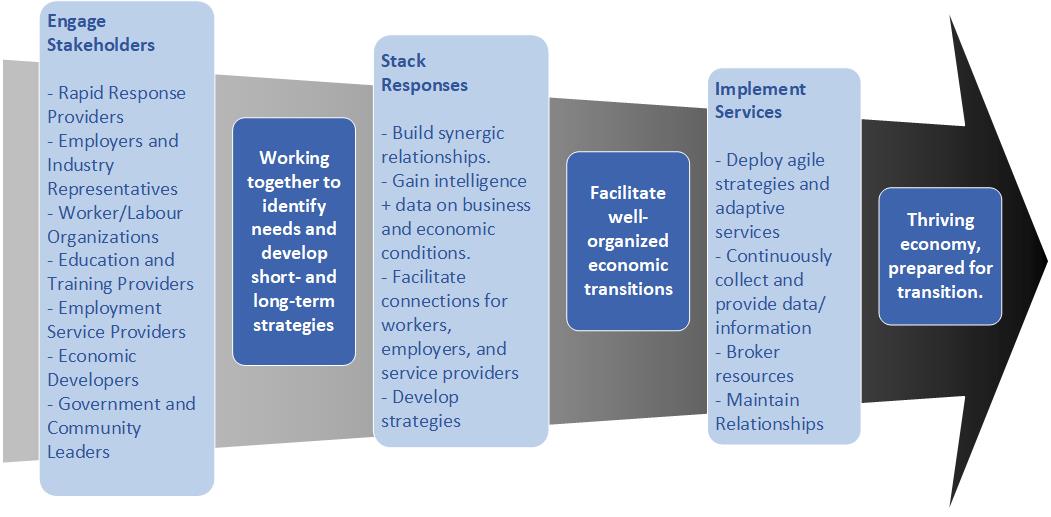Workforce disruptions can be triggered by a variety of community and organizational breakdowns, by unforeseen technological leaps within a particular sector and/or by the cascading outfall of massive social interrupters – such as the current COVID-19 pandemic. Not surprisingly, such conditions often trigger immense socioeconomic stresses for workers as well as the businesses and communities that employ them. While the full scale and impact of COVID-19’s massive workforce disruption are yet to unfold, evidence from historical patterns and practices from comparable jurisdictions can inform timely responses, mitigate some of the impacts and alleviate long-term fallout.
In the context of such workforce disruptions, Rapid Response initiatives are proactive, solutions-focused, and flexible strategies designed to respond to layoffs and closures. Rapid Response activities can be delivered by local governments or non-government organizations dedicated to workforce well-being and are intended to provide immediate aid to employers and affected workers in times of community and/or socioeconomic crisis. Rapid Response teams work with employers and employee representatives to maximize public and private resources and minimize disruptions associated with job loss. While financial supports are core to the ability of Rapid Response interventions, other resources that can be mobilized for the benefit of the local economy may include space, training opportunities, social service pathways as well as employer commitment to the well-being of their affected workers. With this approach, Rapid Response initiatives can provide customized services directly to affected companies, and assist communities and workers through the painful transitions associated with job restructuring and/or loss.
The ultimate goal of Rapid Response initiatives is to work alongside employers, workers and community stakeholders as a first response in times of workforce crisis, in order to prevent unemployment. Failing that, Rapid Response initiatives strive to assist workers and employers by triaging and expediting priority services through the critical crisis discovery, peak and recovery periods, in order to mitigate the socioeconomic impact of job retrenchment. Such services can include, but are not limited to, co-ordinating financial and other social supports to compensate lost income, access to free upskilling and reskilling opportunities to enhance market competitiveness, as well as personalized supports toward market re-entry and career path navigation.
“Rapid Response initiatives are proactive, solutions-focused, and flexible strategies designed to respond to layoffs and closures.”
While the particular services and structures of Rapid Response initiatives are naturally unique to local circumstances and opportunities, insight into successful practices from the US are generally staggered through crisis discovery, peak and recovery periods with the same core priorities:
- Gathering, understanding and acting upon timely insights necessary to mounting evidence-based strategies, triaged to emerging workforce realities and opportunities.
- Designing and delivering rapid services agile to labour-market shifts in order to mitigate negative socioeconomic impacts on (especially vulnerable) workforce stakeholders.
- Documenting and sharing frontline workforce development insights that will inform targeted and sustainable responses to immediate, short-term and long-term industry workforce needs.
In Ontario, Hospitality Workers Training Centre (HWTC) is learning from such promising practices in comparable jurisdictions, and leveraging lessons in response to the unprecedented impact of the pandemic on our tourism, hospitality and food service sectors. Massive layoff and business closers have necessitated a proactive and rapid response from HWTC and moving forward with an evidence-based approach to a timely sector-focused service delivery, HWTC’s Rapid Response activities include:
- Engaging stakeholders: Leading the establishment of a labour-management-community expert taskforce to inform and secure buy-in for key project processes and deliverables. Partnering with economic development and other organizations to avert worker dislocations.
- Collecting and sharing data: Collecting information related to the dislocations and available worker resources, to be shared with our community and sector stakeholders at large. Taking the lead with province-wide dissemination of sector-specific information on the availability of opportunities, services and activities.
- Implementing stabilization services: Directly engaging with affected employers and workers to provide information and facilitate access to available resources and services as well as providing emergency assistance tailored to closures or layoffs.
- Initiating recovery services: Co-ordinating and providing (where appropriate) integrated training and wraparound services to meet the short– and long-term needs of the affected workforce.
- Sharing our learnings: Developing continuous evaluation and renewal activities, including documenting and sharing learnings of successful strategies and tactics for uptake in other contexts.
You can learn more about the value and best practices of adaptive Rapid Response initiatives by reading HWTC’s latest Monograph research brief, “Focus: A Rapid Response Approach to Mitigating the Impact of Local and Massive Workforce Disruptions.”
Subscribe to the CareerWise Weekly newsletter to get the best of CareerWise delivered to your inbox each Tuesday.






